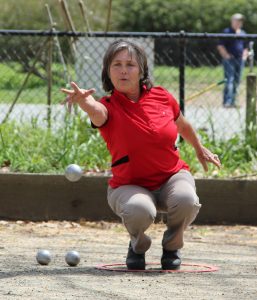I dislike arrogant men and diva behavior in either gender. Robin Wright
 You play pétanque because it is fun, but to really enjoy the game you have to play with people who are likable and easy to get along with.
You play pétanque because it is fun, but to really enjoy the game you have to play with people who are likable and easy to get along with.
In this discipline, there are two distinctive events: casual games and tournaments.
Casual games are meant to be friendly and relaxed. All the rules and regulations that apply to tournaments need not be rigidly enforced.
Winning is nice but not overly important. What is central to the game is the pleasant interaction between team members and the opposite team.
Joking, laughing is tolerated, even encouraged.
Tournaments are different animals. You often play against strangers, for honorific or monetary rewards. Competition is keener and all the rules have to be observed.
Playing against strangers is like going on a first date. As the game progresses you observe and forge an opinion.
Most competitors are cool but some can antagonize you right off the bat. They can be cocky, pompous or over litigious.
Another reason of enmity can be caused by a team spending an inordinate amount of time discussing strategy. Seasoned players should almost immediately know what to do. If not, thirty seconds should be enough to evaluate the situation and commit to action.
Lengthy powwows are pointless and highly irritating. So are “highfives” by the way.
Fortunately the majority of players are walking the line.
It is always nice to win, but losing against fair play, skilled competitors is not the least bit traumatic.
It is the Gods’ way to remind you that there is still plenty of room for improvement in your game.
Although physical, pétanque is a highly emotional exercise.
A good competitor should stay as cool as a cucumber and keep his mouth shut and his powder dry.
Keeping his temper in check is the mark of a wise player.
All sports are unpredictable. To win, you need skill, discipline, daring and a few generous heapings of luck.
Alain
